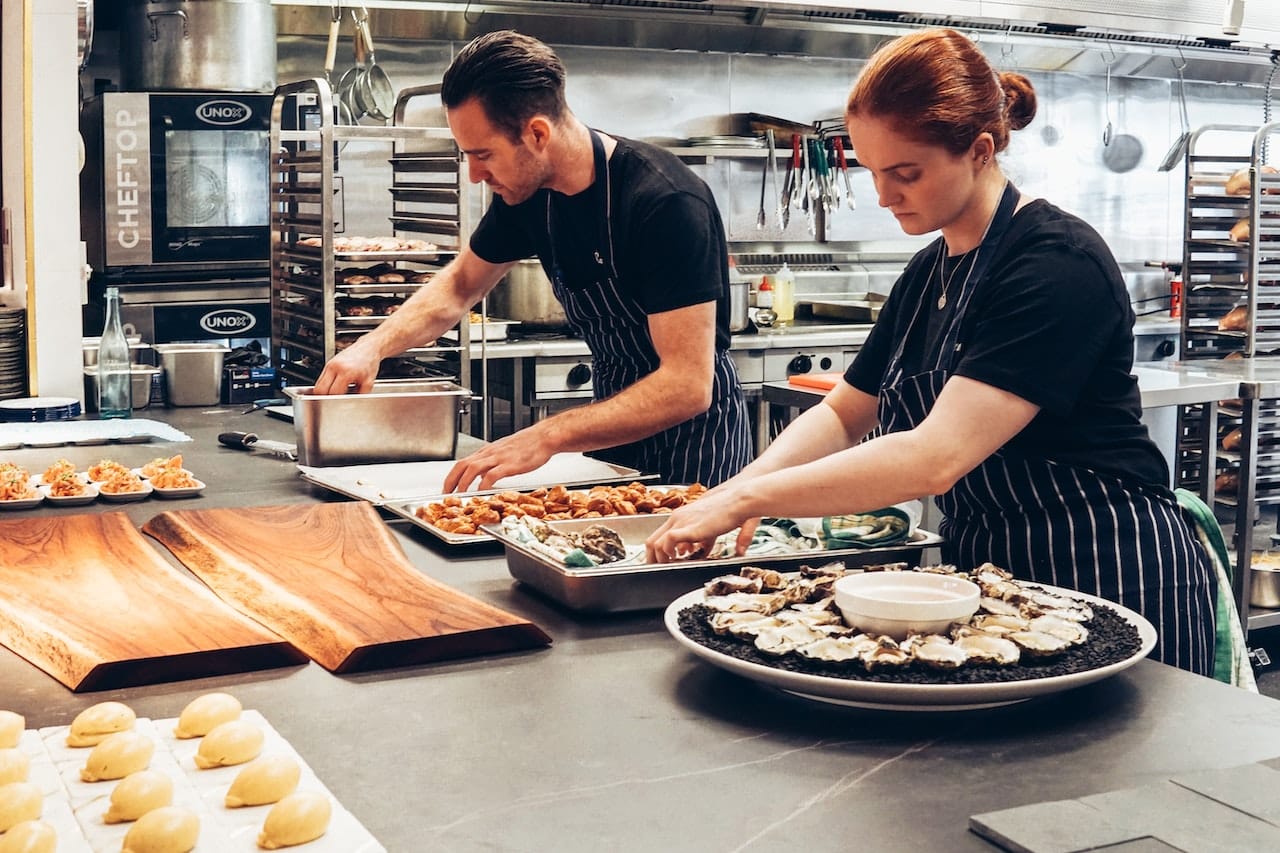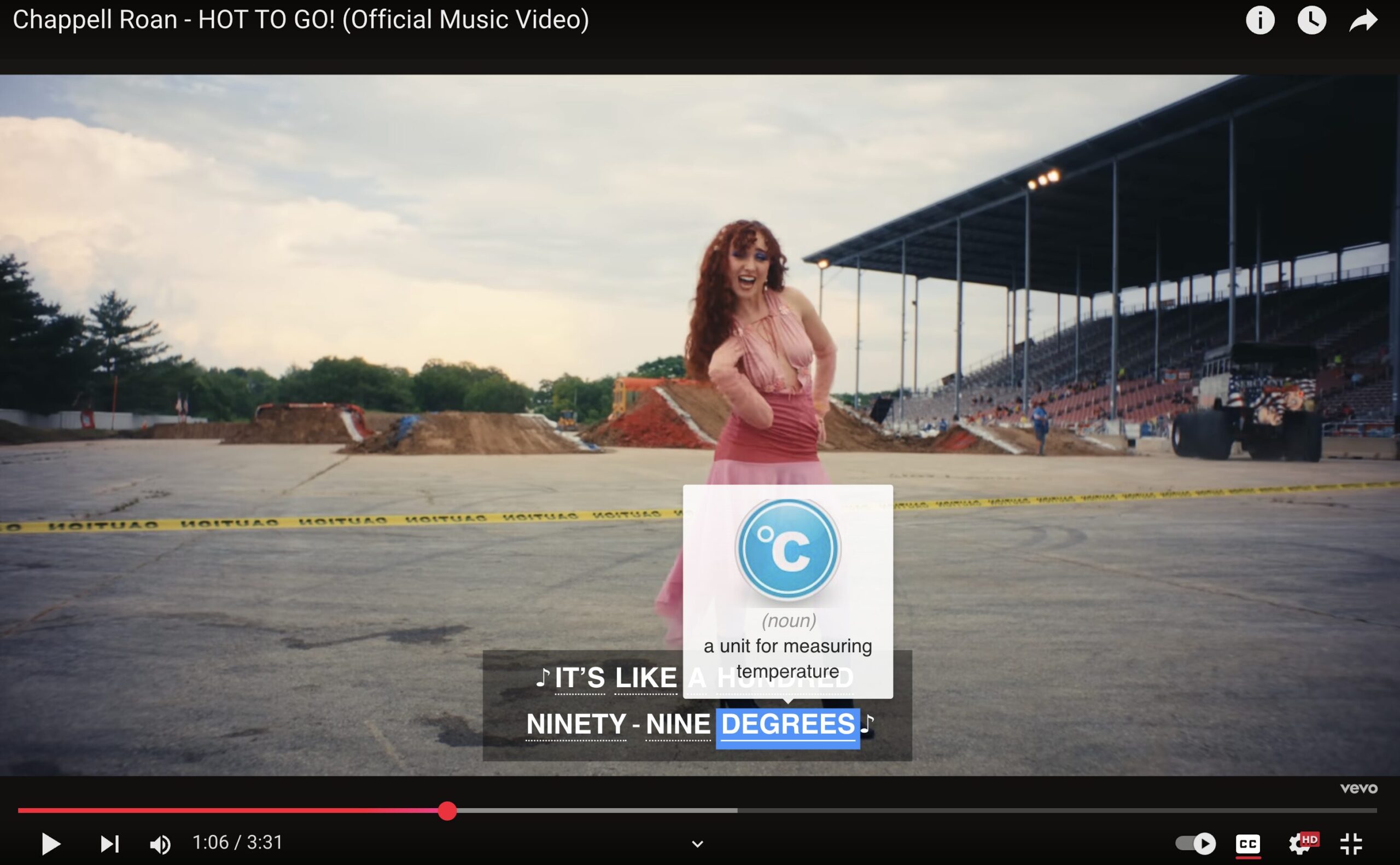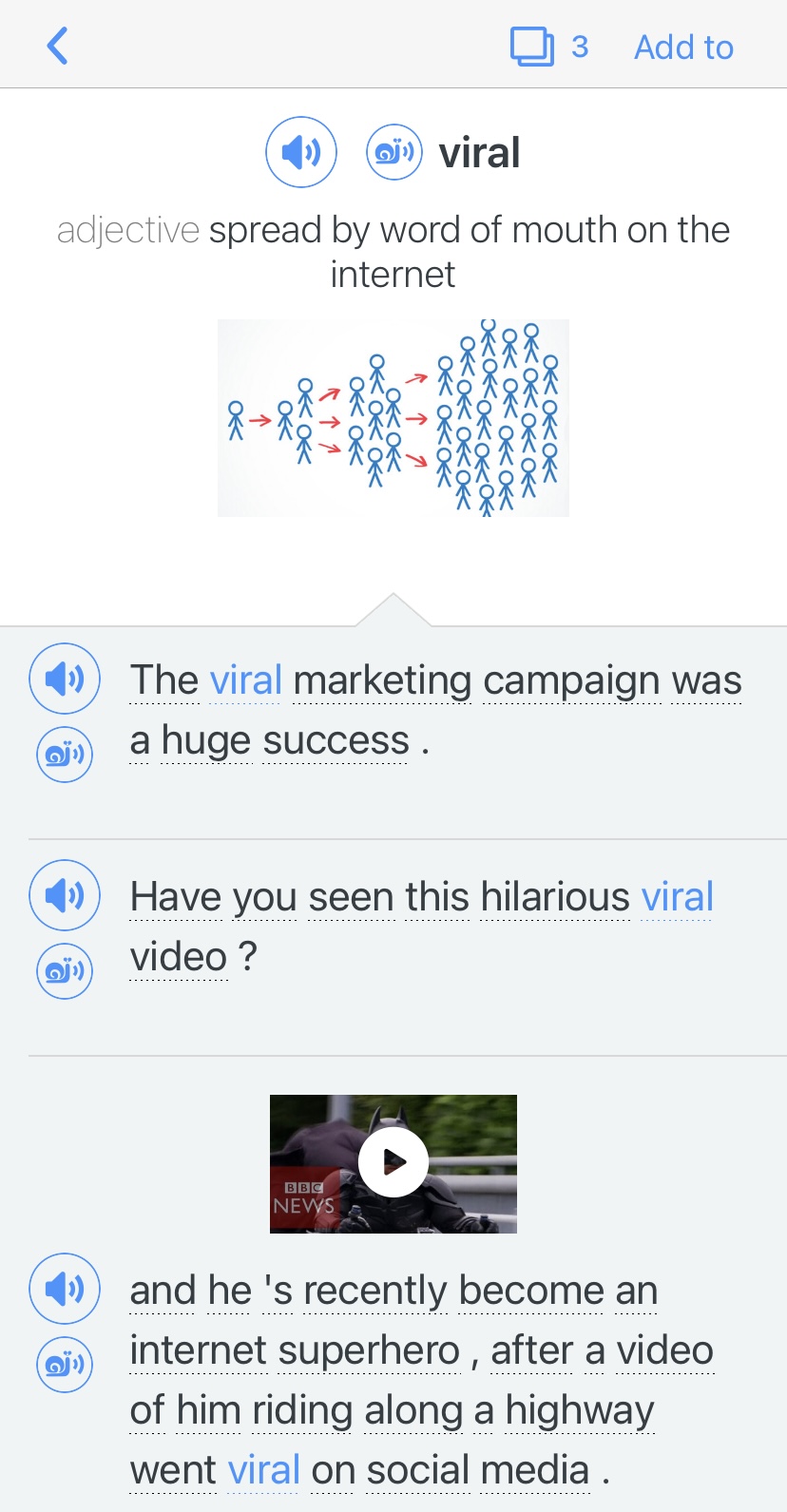English for Restaurant Staff: 200+ Essential Vocabulary

There are so many other jobs in the restaurant industry. For all of these jobs, knowing English is a huge advantage. English for restaurant staff varies by job type, but overall it’s formal, polite, fairly simple and worth learning.
Below, you will find information for each job type, common phrases, study resources, additional vocabulary for restaurant workers and even how to practice this type of English.
Download: This blog post is available as a convenient and portable PDF that you can take anywhere. Click here to get a copy. (Download)
English for Restaurant Staff Positions
1. Waiter / Waitress
Waiters and waitresses are some of the most visible employees of a restaurant. They take food and drink orders, serve dishes and beverages and just generally help customers get what they want.
As a waiter, you’ll see and speak to many customers every day. Good English skills are important! There’s plenty of repetition in this position, which you’ll learn quickly as you work.
This job is also one of the easiest to practice for, since you’ll find waiters in nearly every restaurant you visit. You can also collect some menus from your favorite restaurants (or online) and learn the different kinds of dishes you might have to serve.
Common phrases:
- May I take your order?
- Today’s special is…
- Can I get you something to drink?
- How are you enjoying everything?
- My name is Adam, and I’ll be your waiter this evening.
- Welcome to our restaurant!
- Are you ready to order?
- What would you like to drink?
- How would you like your steak cooked?
- Is there anything you’re allergic to?
- Can I take your order, please?
- Would you like a starter before your main course?
- Are you enjoying your meal?
- Is everything to your satisfaction?
- Can I bring you anything else?
- How would you like your coffee?
- Would you like dessert?
- Can I get you the check?
- We offer daily specials. Would you like to hear them?
- Do you need help with the menu?
- Are you ready for the next course?
- How spicy would you like your dish?
- Is there anything specific you’d like me to recommend?
- Our pasta dishes are made fresh in-house.
- Our seafood is locally sourced.
- Would you like tap water or bottled water?
- Can I get you any condiments?
- We have a vegan and gluten-free menu available.
- Would you like your salad dressing on the side?
- Thank you for dining with us. Enjoy your meal!
Study resources:
- Here’s a useful list of sample conversations you might have as a waiter or waitress.
- Before you go to a real restaurant, you can watch this video to know what you should expect to hear. This is also a good place to learn how to present yourself as a waiter. (Hint: You need to be polite and courteous.)
- Here’s another great video that teaches basic restaurant and waiter vocabulary.
- Waiters also have to speak to the staff in the back of the restaurant. Some of the terms you might need for that can be found here.
2. Host / Hostess
The job of a host or hostess is to greet and seat patrons (customers). A restaurant host greets the customers with a smile, speaks politely and sometimes takes reservations.
A host also needs to be tactful (polite in a subtle way). For instance, if there’s a long wait to be seated, it’s the host’s job to let the patrons know they’ll need to wait—without making them angry about the wait.
Good English and a genuine (real) smile are important for this position!
Common phrases:
- How many people are in your party?
- Do you have a reservation?
- There will be a 10-minute wait.
- Your table is ready.
- Right this way.
- Good evening. Welcome to our restaurant.
- The wait time for a table is approximately 25 minutes.
- May I take your coat?
- Please follow me to your table.
- Here is the menu. Can I get you any drinks to start?
- Is there a special occasion we should know about?
- Would you prefer a table by the window or in a quieter area?
- Our chef’s specials for today are…
- Is there anything I can assist you with?
- We have highchairs and booster seats available for children.
- Please inform us if you have any dietary restrictions or allergies.
- The restroom is located at the end of the hallway on the right.
- Our bar area is open for waiting. Would you like to have a drink there?
- Thank you for waiting, your table is ready now.
- Would you like me to split the check, or put it all on one bill?
- I apologize for the wait. We’re doing our best to seat you as soon as possible.
- Your server will be with you shortly to take your order.
- If you need anything, don’t hesitate to ask.
- We offer complimentary bread and butter while you wait.
- Our restaurant has a dress code. Would you like more information?
- Can I offer you our drink specials for today?
- Is there anything else I can do to assist you?
- Thank you for choosing our restaurant. Enjoy your meal!
Study resources:
- What makes a great host? This article explains some of the most important qualities a restaurant host should have.
- How do you politely say “no”? This page teaches the difference between polite and impolite English.
3. Bartender
A bartender’s job is to mix and serve drinks. Most places require a special license to be a bartender, since you’re often serving alcohol. Because of this, not every restaurant has bartenders.
A bartender needs to know many different liquors and cocktails (mixed drinks). It might also be a good idea to brush up on your small talk, as some customers really like talking with the bartender.
More expensive restaurants might also have a sommelier, which is someone who specializes in fine wines. The phrases used by a sommelier are very different and specific to the wines they serve.
Common phrases:
- On the rocks
(Meaning: on ice) - What can I get you?
- Would you like to open a tab?
(If someone opens a tab, it means they can order as many drinks as they want, and pay for them together at the end of the night. It usually requires the customer to leave their credit card with the bartender.) - I’ll just need to see your ID first.
- Would you like your drink shaken, or stirred?
- Would you like your cocktail with ice, or neat?
- What type of glass would you prefer?
- Are you enjoying your drink?
- Here’s our cocktail menu.
- Can I see your ID, please?
- Do you have a preference for the type of alcohol in your cocktail?
- I can make that drink with a twist of lemon if you’d like.
- How strong would you like your drink?
- What can I get started for you?
- Have you decided on red or white wine?
- What is your preference for the intensity of the wine?
- Are you looking for something refreshing, or something more robust?
- Would you like a full-bodied or light-bodied wine?
- Shall I recommend a wine to pair with your meal?
- This wine has notes of blackberry and oak.
- Would you like to taste the wine before I pour it?
- Do you prefer wines from a specific region or country?
- Here’s the wine list. Take your time choosing.
- Enjoy your drinks.
Study resources:
- This page has a guide to the vocabulary words a bartender will need to know.
- What kinds of drinks should you know as a bartender? Here’s a list to get you started.
- What should you talk about as a bartender? Some top bartenders share their tips in this easy article.
- If you want to specialize in wines, here’s a list of vocabulary words related to wines.
4. Manager
The manager is in charge of making sure the restaurant runs smoothly. They make many important decisions (choices). As a manager, you will need to give clear instructions to everyone involved, and step in to help if a customer has a complaint.
As a manager, it’s helpful to know professional and business English, while still being able to connect in casual, less formal English. That’s because the manager’s job requires them to speak to patrons, employees and professionals in the field.
Common phrases:
- Please accept my apologies.
- What seems to be the problem?
- Please accept this dessert, on the house.
(“On the house” means it’s free; the restaurant will pay for it.) - Keep up the good work!
(Said to the employees.) - Are you enjoying everything tonight?
- May I show you to your table?
- Enjoy your meal!
- How is everything tasting?
- Is there anything else I can assist you with?
- I apologize for the inconvenience. Let me make it right.
- Our special for today is a favorite of mine. It’s…
- I’ll have that dish prepared as per your request.
- How are the preparations going in the kitchen?
(Said to a staff member.) - We have a reservation for a table of six under the name of David S.
- Could you kindly check on table number six?
(Said to a staff member.) - Can I get you something to drink while you wait?
- Our dessert menu features a variety of options.
- We’d be happy to make that vegetarian for you.
- Thank you for dining with us tonight. We appreciate your patronage.
- Do you have any suggestions or feedback to improve our service?
- I will look into that issue right away.
- Let’s hold a meeting to discuss improvements and address any concerns.
(Said to staff members.) - Have you completed the inventory for this week?
(Said to a staff member.) - Thank you for your great work! Your dedication is noticed and appreciated.
(Said to a staff member.)
Study resources:
- When a customer has a complaint, the manager often gets called in to handle the problem. This article provides steps for resolving issues with customers.
- Want to see those tips in action? This video has some examples of a manager responding correctly to a customer’s complaint.
- Of course, your job as a manager isn’t just to deal with complaints. In this video, a number of managers speak about their jobs and what it takes to be a manager. You can find some great business vocabulary in there, too!
5. Cook / Chef
You guessed it: The cook cooks! There are different kinds of cooking positions, each with their own name and experience requirements. Cooks and chefs have their own lingo too—vocabulary that’s only used by them.
The type of vocabulary you’ll need may vary depending on the kind of restaurant you work at. There are a couple of phrases and restaurant vocabulary words that you’ll find anywhere, so it’s a good idea to start there.
Common phrases:
- Give my compliments to the chef.
(This is said to the chef, by happy customers!) - I need a chicken pasta supreme, on the fly!
(“On the fly” means very fast.) - This burger needs to be well done, so kill it.
- Yes, chef?
- Behind you!
- Fire the oven!
- Can I have a tasting spoon, please?
- Plate up, please!
- How long on that ticket, chef?
- Let’s work on cleaning as we cook!
- Can you grab me a new cutting board, please?
- That dish is not properly seasoned.
- This needs a little more salt.
- How many portions for this dish?
- We need to ensure consistency in our plating.
- The dish needs a little more complexity of flavor.
- How long does that take to cook?
- Can you taste this? What does it need?
- We need to be better organized in the kitchen.
- Can we use fresh herbs in this dish?
- Can you help me with the prep work, please?
- We need to reduce the heat on this sauce.
- Keep an eye on the sautée station, please.
- This sauce needs to simmer for another 10 minutes.
- Is the fish cooked through? Check the internal temperature.
- Can you start plating the appetizers, please?
Study resources:
- Chefs need to know the basics of cooking, and you can find the English terms for them at this link.
- Now you’re ready to move on to chef speak! Here are 16 commonly used chef terms.
- What kind of chef do you want to be? To learn about the different kinds of chefs, visit this page.
6. Busser
Not every restaurant has a busser, but they can be a huge help to the rest of the staff. A busser’s job is to clear tables and refill drinks.
The busser also helps keep things moving at a fast pace, so that customers can move in and out of the restaurant at a steady pace (speed). Thus, bussers need to know how to be polite to customers.
The normal amount of time for patrons to stay at their table varies by country, so be aware of these cultural differences. For example, in the United States, a busser might clear plates from a table as soon as the plates are empty. However in Spain, patrons often have long, relaxed meals, and they usually stay at the table to talk long after they’ve finished eating.
Common phrases:
- Sorry to keep you waiting.
- May I take your plate?
- Would you like a refill?
- May I clear your plates?
- Can I refill your water glass?
- Are you finished with your appetizer?
- Is everything to your satisfaction?
- Do you need any more napkins or silverware?
- Would you like me to bring a dessert menu?
- Can I assist you with anything else?
- Excuse me, may I remove your empty plates?
- Can I offer you a to-go box for your leftovers?
- Thank you for dining with us! Have a great night!
- I’ll take care of the dirty dishes and glasses.
(Said to a staff member.) - I’ll reset the table for the next guests.
(Said to a staff member.)
Study resources:
- This article speaks about the importance of bussers, and why they shouldn’t be overlooked by restaurants. It’s a long, somewhat complex article, but the bottom portion has some useful tips on how to be a good busser.
- What else does a busser do? This page describes all the potential job responsibilities of a busser.
More English Vocabulary for Restaurant Workers
Here are some common and useful terms used by restaurant staff members:
- Table setting
- Reservation
- Seating arrangement
- Waitstaff
- Menu
- Specials of the day
- Appetizers
- Main courses
- Desserts
- Beverages
- Wine list
- Taking orders
- Service station
- Splitting the check
- Tip
- Gratuity
- Special dietary requirements
- Allergies
- Food presentation
- Garnishing
- Fresh ingredients
- Chef’s recommendation
- Tray
- Carafe
- Tablecloth
- Napkin
- Knife
- Fork
- Spoon
- Plate
- Glassware
- Barista
- Espresso machine
- Milk steamer
- Liqueurs
- Happy hour
- Last call
- Closing duties
- Shift change
- Server
- Dishwasher
- Front of house
- Back of house
- Table service
- Takeout
- Ingredients
- Food preparation
- Plating
- Side dish
- Point of sale system
- Reservation book
- Waitlist
- Table turnover
- Opening procedures
- Uniform
- Food safety
- Sanitation
- Customer satisfaction
- Maître d’
- Dietary restrictions
- Tableside service
- Corkage fee
- Patron
- Pitcher
- Tip pooling
- Table-turning
- Carryout
- Delivery
- Kitchen order ticket
- Expediting station
- Special requests
How to Practice Restaurant English
As an employee in a restaurant, your most important concern is communication. You need to understand and be understood.
You may have already noticed that the English used by restaurant staff can be repetitive. This is great news for you! Learn the most often repeated phrases and words, and you’re already halfway there.
Here are some ways you can practice using English restaurant vocabulary:
- Role play. All you need is a friend to practice speaking with! Role play is when you pretend to be someone else, or you pretend to be in a certain type of situation.
So, grab a friend and choose your roles. If you’re hoping to be a waiter, for instance, you can pretend to be the waiter and your friend can be the customer. You can also role play with a fellow student, a teacher or even a Skype tutor.
- Go to a restaurant. If you already live in an English-speaking country, just go visit a restaurant! Keep your eyes and ears open, and you’ll hear plenty of phrases and vocabulary repeated by the restaurant staff.
If you visit an open kitchen restaurant (where you can see the food being prepared), you may even get to hear some “back of the house” English. Take your notebook with you and write down any phrases you hear often but don’t know.
If you don’t live in an English-speaking city, check out areas that are tourist-heavy. The tourism industry often uses English, and any restaurants in tourist hot spots are likely to have English-speaking staff. (If your waiter is a native, ask them to speak English to you!)
- Watch restaurant TV shows. To get a look into the back of a restaurant, you can watch restaurant shows. TV shows like “Hell’s Kitchen” and “Restaurant: Impossible” take you inside the restaurant business in a unique way.
These shows not only teach you the English you might use in a restaurant kitchen, but they also show you what it’s like to work in one. (Of course, you probably won’t have a famous cook yelling at you as you work!)
- Watch culinary travel shows. You can “visit” restaurants all over the world by watching culinary travel shows. By watching “Diners, Drive-ins and Dives,” for example, you can travel across the United States and hear the way restaurant staff members speak in different parts of the country.
If you want to watch authentic English videos that have helpful learning tools, you can check out FluentU. This language learning program uses real English videos—like music videos, talk shows, vlogs and more—to teach you the language.
Remember that the English you’ll need is a bit different for each type of restaurant job. Choose a focus: Which job do you plan on applying for? What country do you want to work in?
Prepare for the position that you’re applying for now—even if you want a different role in the future. The rest of the learning will be easier once you’re actually working in a restaurant because you’ll be immersed in (surrounded by) restaurant English.
English for restaurant staff is really just a certain type of professional English.
And learning it gives you the option of working in the tourism industry in any English-speaking country, where the other staff and customers might not speak your native language.
So no matter what restaurant career you decide to pursue, you can use this resource guide to get you started!
Download: This blog post is available as a convenient and portable PDF that you can take anywhere. Click here to get a copy. (Download)
And One More Thing...
If you're like me and enjoy learning English through movies and other media, you should check out FluentU. With FluentU, you can turn any subtitled content on YouTube or Netflix into an engaging language lesson.
I also love that FluentU has a huge library of videos picked specifically for English learners. No more searching for good content—it's all in one place!

One of my favorite features is the interactive captions. You can tap on any word to see an image, definition, and examples, which makes it so much easier to understand and remember.
And if you're worried about forgetting new words, FluentU has you covered. You'll complete fun exercises to reinforce vocabulary and be reminded when it’s time to review, so you actually retain what you’ve learned.
You can use FluentU on your computer or tablet, or download the app from the App Store or Google Play. Click here to take advantage of our current sale! (Expires at the end of this month.)

















